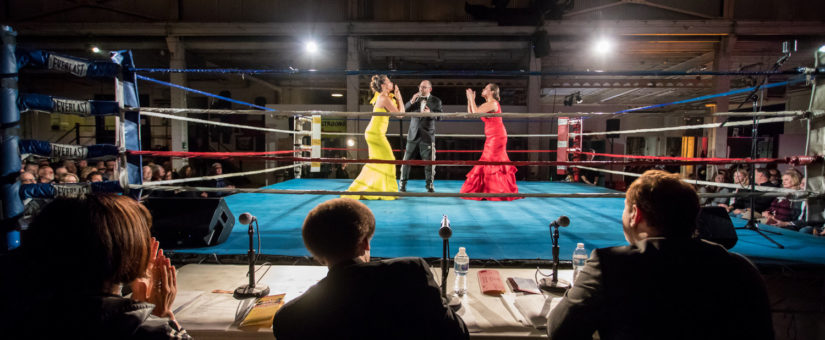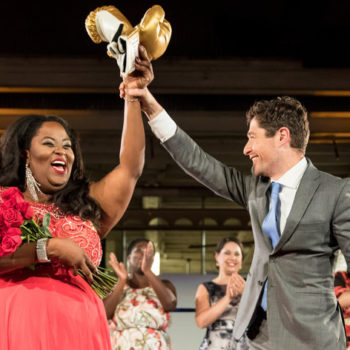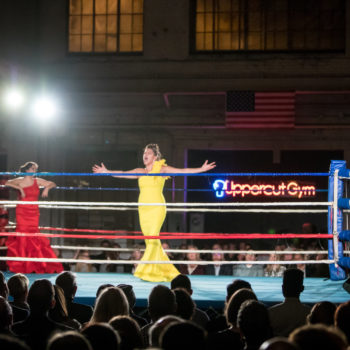
Diva Cage Match ‘Entertaining & Accessible’
- Posted by Out of the Box Opera
- On October 13, 2018
Star Tribune
With Diva Cage Match, director David Lefkowich goes to battle for a classic art form.
In March 2015, David Lefkowich was at the University of Kentucky, directing “The Tales of Hoffmann.” It was the first time Jacques Offenbach’s opera had been presented there.
“The night before,” Lefkowich recalled, “there’s a basketball game with 30,000 people in attendance. The next night, opening night of my opera, there are 300 people.
“But that’s not the worst part. The worst part was people congratulating themselves on having that many people come. And I thought — this is a problem. Both of these things are exciting in their own right. But one has 30,000 people and a lot of money behind it. The other has 300 and a lot of gumption behind it.
“I got obsessed with this idea of competition, and how opera is like an Olympic sport. I started thinking, ‘What’s a place where competition exists and opera could be harmonious with that?’ Because opera doesn’t belong just anywhere.
“Then somebody mentioned Uppercut Boxing Gym, and I went there, and I thought — this is an operatic space. Not in a traditional sense, but it feels dramatic.”
That was the moment Diva Cage Match was born. In October 2017, six young sopranos in makeup and gowns gathered at Uppercut. Two by two, they faced off in the ring before a sold-out crowd and a panel of celebrity judges that included Dessa, J.D. Steele and operatic baritone Lucas Meachem. They sang. They postured. But first, they had to climb through the ropes.
Lefkowich was master of ceremonies. “The moment before we started, I laughed and thought, This is either going to kill my career, or it’s going to be the start of something exciting.” Before long, “people were whooping for Wagner.” And these were not Wagnerphiles, he said. They took a chance on something new because it sounded like fun.
An operatic laboratory
Based out of New York City, Lefkowich is a high-energy person with a firehose of ideas about making opera more popular and accessible. He has directed operas across the United States, in Canada and Europe. He’s been part of the Twin Cities opera scene since 2008, when Minnesota Opera’s Dale Johnson tapped him to direct “Romeo and Juliet,” then “Salome” in 2010. “I give him the credit for launching me in this city,” Lefkowich said.
From 2011-17, he was artistic director of the Mill City Summer Opera, a success from the start. He directed every production except the most recent, “Carmen.”
Alex Legeros, development officer at the Museum of Russian Art in south Minneapolis, met Lefkowich in 2014, when Legeros joined the Mill City Summer Opera board.
“David works all over the world,” Legeros said. “He’s big in New York, big in L.A., big wherever he goes. He’s charismatic, he’s engaging, he can find the local talent. He’s constantly meeting people. We started coming up with ways to use him when he was in town, to make the best of what we got when we had him.”
Lefkowich gave presentations at places such as the Minikahda Club. He developed a class he called Opera 101, featuring singers from the Mill City Summer Opera. “People loved it,” Legeros said. “They liked having some kind of handshake into the history of opera, what to listen for, why people are soprano, alto, tenor, bass.”
In 2017, Lefkowich co-founded Out of the Box Opera with arts supporters Noah Eisenberg and Jim Berman. Its mission: to bring opera to new audiences in new ways. And new places. “The opera house is going to be there,” Lefkowich said. “Let’s see what happens when we take opera out of the box — the opera house.”
A Valentine’s Day 2017 program of opera hits and musical theater classics called Love Lost/Love Found sold out at the Weisman Art Museum at the University of Minnesota. Then came the first Diva Cage Match. In February 2018, back at the Weisman, Opera + Jazz/Soul was another hit. Nothing was longer than two hours.
What’s next? An actual season of events, announced in late September. Diva Cage Match 2.0 will take place Saturday at Uppercut. This year’s celebrity judges will be actor and singer T. Mychael Rambo, jazz singer Patty Peterson and American soprano Emily Pulley. The winner will be crowned by Minneapolis Mayor Jacob Frey.
In February 2019, the Weisman will host Opera Gospel. In May, Heroes and Villains will be presented at the Pillsbury “A” Mill in Minneapolis, a space Lefkowich is dying to try.
“We’re using Minneapolis as a sort of laboratory,” he said. “There’s an incredible educated audience who are thirsty for cultural events. We can develop here and bring our best products elsewhere.
“For example, this fall we’re taking Opera + Jazz/Soul to New York City. Diva Cage Match will also go on the road. We’re collaborating with smaller opera companies in different cities and presenting it in Austin, Texas, Detroit, Pittsburgh and hopefully some other places as well.”
‘It was life-changing’
According to Legeros, support for the new Minneapolis nonprofit has grown. The donor list continues to expand. Expenses are low, compared with other opera companies. “They don’t need $100,000 to $200,000 to do an opera production,” he said. “They can operate on a 10th of that budget and still have great success.”
Lefkowich provided more perspective. “I assisted Julie Taymor at the Met on ‘The Magic Flute’ and that was a $5 million production. When we did our first Out of the Box event, we spent $900.
“There will always be beautiful things about spending millions of dollars on a production. But we’re trying to get to the essence of what makes music special. Let’s strip away the price tag. Let’s strip away the things we add to opera. What’s exciting about the art form? The singing.”
For Lefkowich, opera is personal. Born and raised in New York, he grew up in a home where Saturday’s Metropolitan Opera broadcast was a regular thing. “You didn’t have to stay in the room, but you couldn’t turn the channel.” He fell in love with the vocal fireworks of the Queen of the Night in Mozart’s “The Magic Flute.” When he saw Wagner’s “Tristan and Isolde” for the first time, “it was life-changing. And I don’t even like Wagner!”
So, what is it about opera? “When you get up close, the music is so intense, so beautifully overwhelming, that you get lost in it, as if you’re in the eye of a hurricane and the opera is swirling around you,” Lefkowich said. “You get caught up and swept away.”
He wants everyone to have that uplifting, ecstatic experience. He also knows that opera’s image needs buffing and updating. “Sometimes these days, we have these preconceived notions about opera. It’s going to be loud. It’s going to be long. It’s going to be expensive. There are a lot of barriers between some people and the opera. We want to make opera entertaining and accessible to everyone, whatever that means.
“Traditionally, opera is something that happens to you. You sit back, you watch it, you passively let it sweep over you. I want people to come and not realize that opera is happening to them. They’re just having a wonderful, entertaining evening where opera happens to be the theme.”
Lefkowich and Out of the Box are looking past the 2018-19 season. “We’d also like to expand into creating full-length operas. New operas, but out of the box, either with their subject matter or how they’re performed. We’re workshopping our first new piece starting this year.”
Prodded for details, he said, “I can’t tell too much. I’ll just say that it’s a New York and Minnesota story, and we’re working with groups in both cities to create something that’s going to be pretty exciting.”
by Pamela Espeland


